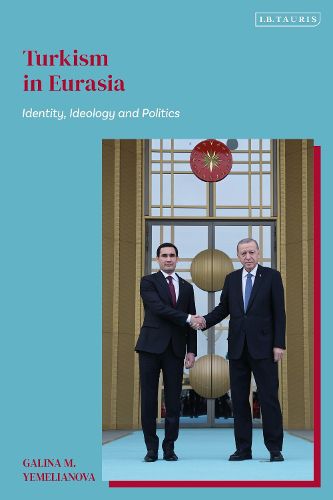Readings Newsletter
Become a Readings Member to make your shopping experience even easier.
Sign in or sign up for free!
You’re not far away from qualifying for FREE standard shipping within Australia
You’ve qualified for FREE standard shipping within Australia
The cart is loading…






Turkism as an idea which emphasizes the Turkic ethnic component in national identity is widely associated with Turks and Turkey. However, many millions of Turkic peoples with distinctive histories, cultures, social and political traditions live outside Turkey. This book discusses the origins and ethno-cultural and political evolution of Tatars, Bashkirs, Azerbaijanis, Uzbeks, Kazakhs and other Turkic peoples of post-Soviet Turkic Eurasia, examining the views of their national leaders and their attitudes towards Anatolian Turks and Turkey. It addresses the geopolitical implications of the increased role of Turkic and Muslim states in the international system; and argues that from the 2000s Turkism became integrated into the national discourses of the new Turkic states and polities, while at the international level it facilitated, rather than shaped, Turkey's cooperation with these states, as well as inter-state relations within the Turkic world. Based on both primary and secondary sources in Russian, Turkish, English and French, the book uses semi-structured interviews with relevant policy-makers, academics and proponents of Turkism; ethnographic observation; archival documents; and contemporary political analysis from Turkic Eurasia and Turkey to provide the first history-based integrated study of the cultural, ideological and political role of Turkism in Eurasia.
$9.00 standard shipping within Australia
FREE standard shipping within Australia for orders over $100.00
Express & International shipping calculated at checkout
Turkism as an idea which emphasizes the Turkic ethnic component in national identity is widely associated with Turks and Turkey. However, many millions of Turkic peoples with distinctive histories, cultures, social and political traditions live outside Turkey. This book discusses the origins and ethno-cultural and political evolution of Tatars, Bashkirs, Azerbaijanis, Uzbeks, Kazakhs and other Turkic peoples of post-Soviet Turkic Eurasia, examining the views of their national leaders and their attitudes towards Anatolian Turks and Turkey. It addresses the geopolitical implications of the increased role of Turkic and Muslim states in the international system; and argues that from the 2000s Turkism became integrated into the national discourses of the new Turkic states and polities, while at the international level it facilitated, rather than shaped, Turkey's cooperation with these states, as well as inter-state relations within the Turkic world. Based on both primary and secondary sources in Russian, Turkish, English and French, the book uses semi-structured interviews with relevant policy-makers, academics and proponents of Turkism; ethnographic observation; archival documents; and contemporary political analysis from Turkic Eurasia and Turkey to provide the first history-based integrated study of the cultural, ideological and political role of Turkism in Eurasia.